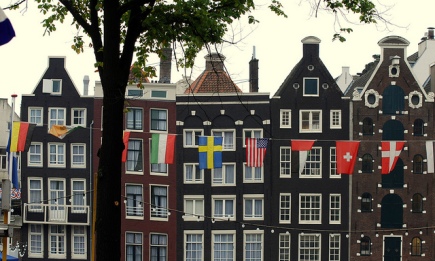Welcome British students, even after Brexit

In the event that the EU fails to come to an agreement with the UK concerning higher education, British students would be forced to pay institutional fees like other non-EU students. The report suggests that higher education institutes in Amsterdam should reach out to the government to lobby for a reduced tuition fee or the creation of a bilateral agreement with the British.
The Amsterdam Centre for European Law and Governance, part of the University of Amsterdam (UvA), was commissioned by the municipality to write this report with recommendations on how to best secure the business climate in the city after Brexit. The larger Amsterdam area has approximately 16,000 economically active British inhabitants, consisting of employees, academic staff, entrepreneurs, and students.
Rising costs, and their consequences
The researchers predict that, after Brexit, the UK will most likely no longer be a partner in the Erasmus exchange programme. “In part because of their [United Kingdom] position, as set out in their white paper, which states that they do not want to be connected to the EU based on (pre-)existing relations between the EU and third party countries such as Norway and Switzerland. Therefore, the United Kingdom also does not want to be a member of the European Economic Area (EEA). This has consequences for treaties and conventions that have been made between EU and EEA countries concerning higher education.”
If the British hold on to the positions set out in their policy paper, British students will not be able to study in the Netherlands for the Dutch statutory tuition fees, a term that has been agreed upon in the Erasmus programme. British students would be required to pay the institutional tuition fee, which is determined by the respective institutes themselves and is usually (significantly) higher than the statutory fee.
British students enrolled at the University of Amsterdam for the academic year 2016-2017 will pay the statutory fee, which amounts to 2,006 euros a year. The institutional fee, however, is a lot higher at a flat rate of 14,740 euros. The VU University Amsterdam imposes different institutional fees depending on the study programme. They range from 12,000 euros for their history programme to 20,600 euros for dentistry (2017-2018 prices). Should Brexit become reality, British students could easily spend up to 10,000 euros more on their tuition alone.
British allure
The researchers also express their concern for a weakening of the bonds between Dutch and British education institutes if going on exchange becomes too expensive for students. “If we want to continue allowing Dutch students to attend prestigious British universities, we should extend the same access to British students wanting to come to European universities. Look for support for this idea with both British and European partners within the Erasmus network.”
It is for this reason that the Netherlands should continue to insist on the United Kingdom remaining a partner country in the Erasmus programme, just like Iceland, Norway, and Macedonia, other non-EU countries (EFTA) that are part of the EEG. “You must try to ensure that the United Kingdom stays a partner country by making bilateral agreements with the EU.”
Furthermore, the municipality should urge the government to change the Higher Education and Research Act (WHW) before Brexit is finalized, researchers argue. “Convince Dutch legislators that British students should not have to pay the institutional tuition fees, but rather can continue to pay the statutory fees. This can be realized through a changing of the law, or by creating a bilateral agreement with the UK.”
Foundation of reciprocity
In their concluding remarks, the researchers question the feasibility of the recommendations. “Whether Dutch politics is prepared to make a unilateral arrangement for British students, only time will tell. The more obvious solution would be a bilateral arrangement based on reciprocity that ensures the access of Dutch students to affordable British higher education.”
It is for this reason that institutes in Amsterdam should be persuaded to undertake steps on this front, even though it won’t be easy. “Talk to the educational institutes about the institutional tuition fees to see if they would be willing to lower them for British students. The chances are small that the universities will voluntarily walk away from this extra income, although there were 527 British students in Amsterdam in 2015, a large amount compared to other students from non-EU countries, i.e. 382 from China, 213 from the United States, and 149 from Russia. Nonetheless, it’s worth trying to have this discussion about the institutional fees with the higher education institutes in Amsterdam.”
Meest Gelezen
Vrouwen houden universiteit draaiende, maar krijgen daarvoor geen waardering
Wederom intimidatie van journalisten door universiteit, nu in Delft
‘Burgerschapsonderwijs moet ook verplicht worden in hbo en wo’
Raad van State: laat taaltoets nog niet gelden voor hbo-opleidingen
Hbo-docent wil wel rolmodel zijn, maar niet eigen moreel kompas opdringen



